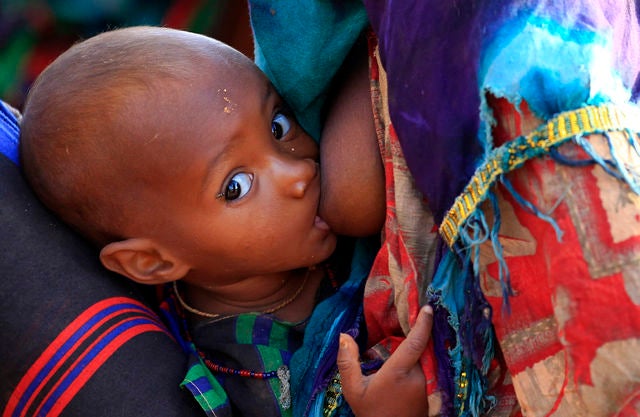WHO chief and former UNDP boss call for end to 'unethical' ads for infant formula
The world health body's director-general and the former head of the UNDP have decried deceptive marketing practices that undermine child health

The World Health Organization's Director-General Dr. Tedros Adhanom Ghebreyesus, and Helen Clark, the former head of the United Nations Development Program, have called for an end to the "aggressive" and "unethical" marketing of infant formula.
“Formula milk marketing represents one of the most underappreciated risks to the health of infants and children,” Ghebreyesus and Clark said in a commentary, “But while exclusive breastfeeding for babies six months and younger has increased only marginally over the past two decades, the sales of formula milk have nearly doubled. Scaling up breastfeeding could prevent an estimated 800,000 deaths of children under the age of five and 20,000 breast cancer deaths among mothers each year,” they added.
"Cynical" advertising of infant formula, which deceptively implies that commercial formulas are better for children than breastmilk, they added in the commentary published last week, can discourage breastfeeding, undermine the confidence of mothers, and exploit the desire of parents to provide their children with the best start in life.
Ghebreyesus and Clark, who is also New Zealand's former prime minister, called on governments to enact and enforce legislation to restrict infant formula advertising and ensure that any such advertising is based on facts. They also called on health professionals and health associations, as well as the formula companies themselves, to insist on fact-based marketing and ethical business practices.
Awareness of the potential harms of infant formula came to the fore in the 1970s, when commercial infant formula became more widely available in Asia, Africa, and Latin America. In some communities where access to clean water was limited, mothers, under the mistaken impression that formula milk was healthier than breastmilk, used whatever water was available to them to prepare their baby’s formula. The water they used was often unsafe, which had devastating consequences for their babies.
In response, the World Health Assembly called for countries to regulate the promotion of infant formula and, in 1981, adopted the International Code of Marketing of Breastmilk Substitutes. The code encouraged countries to restrict the advertising and promotion of infant formula, its marketing in health care systems, and its labeling.
In 2016, a landmark Lancet series on breastfeeding also outlined the risks of breastmilk substitutes in low- and middleincome countries, and detailed how exclusive breastfeeding reduces the risk of diarrhea and saves the lives of infants.
The commentary added that “formula milk has its place for mothers and parents who are not able to breastfeed for a host of reasons, including a lack of support by social and health systems" and that "it is formula milk marketing, not the product itself, that disrupts informed decision-making and undermines breastfeeding and child health.”
The impact of formula use and low exclusive breastfeeding rates is exemplified by the experience of the Kyrgyz Republic. Research by Exemplars in Global Health has found that advocacy and policy efforts to restrict the marketing of commercial formula milk and promote breastfeeding contributed to the Kyrgyz Republic’s reduction in childhood stunting. The country took a multi-pronged approach to strengthen support for breastfeeding. The data shows that the government’s advocacy and policies improved the quality of breastfeeding throughout the country and contributed significantly to the decline in childhood stunting rates from 36 percent in 1997 to 12 percent in 2018.
Health leaders from countries with low exclusive breastfeeding rates or low quality of breastfeeding and high levels of childhood stunting could look to the Kyrgyz Republic’s experience for strategies and lessons for a potential pathway toward reducing stunting levels. In 2000, the government, in partnership with the WHO and UNICEF, launched the Baby Friendly Hospital Initiative to promote breastfeeding in maternal hospitals by highlighting key clinical and management procedures in hospitals that encourage proper breastfeeding. A year later, the country established Village Health Committees to promote healthy practices, including improving breastfeeding and, by 2011, these committees were operating in 60 percent of villages across the country. Finally, in 2008, the Kyrgyz government passed a law prohibiting the use of images in the marketing of commercial milk formulas, and formula advertisements were required to state the benefits of breastfeeding.
Although the Kyrgyz Republic’s rate of children ever breastfed has always been high – it was 90 percent even before these efforts – these policies and advocacy efforts significantly improved the quality of breastfeeding in the country. Between 1997 and 2012, the number of infants breastfed within one hour of birth increased from 44 percent to 84 percent and the median duration of exclusive breastfeeding increased from less than one month to almost three months. Infant growth curves demonstrated the positive impact of these changes. In 1997, children’s growth started to falter almost immediately after birth in the country, but by 2014, growth curves within the first six months after birth were more robust.
